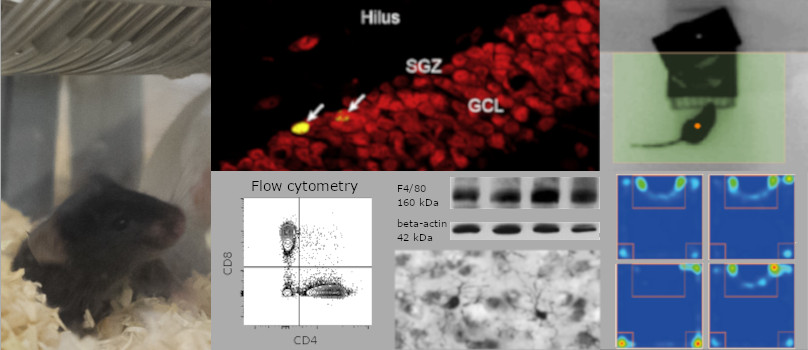Main content
Top content

Behavioural Neuroimmunology
Immune cells are important mediators of neuronal development and function. Hence, they play a crucial role in the development of neuropsychiatric disorders such as major depression. In our research, we apply a multidisciplinary approach including behavioural, immunological and neurobiological methods. Using animal models, we investigate how immune responses triggered by stress responses or inflammatory processes shape stress vulnerability and resilience and impact brain and behaviour.
Research topics
- Effects of the immune response on stress susceptibility and resilience
- Effects of genetically predisposed stress reactivity on immune responses, brain and behaviour
- Long-term effects of life events on immune responses, brain and behaviour
Model systems
- Laboratory mice
- Transgenic mouse lines
- Primary cell cultures
Methods
- Behavioral tests for emotional behaviour, learning and memory
- Ex-vivo stimulation assays in primary cell cultures
- Immunophenotyping by flow cytometry
- Gene and protein expression analyses
- Immunohistochemistry and microscopy
Selected publications
Ambree O, Ruland C, Zwanzger P, Klotz L, Baune BT, Arolt V, Scheu S, & Alferink J (2019) Social Defeat Modulates T Helper Cell Percentages in Stress Susceptible and Resilient Mice. Int J Mol Sci 20(14), doi: 10.3390/ijms20143512. pdf
Ambree O, Ruland C, Scheu S, Arolt V, & Alferink J (2018) Alterations of the Innate Immune System in Susceptibility and Resilience After Social Defeat Stress. Front Behav Neurosci 12:141, doi: 10.3389/fnbeh.2018.00141. pdf
Buschert J, Sakalem ME, Saffari R, Hohoff C, Rothermundt M, Arolt V, Zhang W, & Ambree O (2016) Prenatal immune activation in mice blocks the effects of environmental enrichment on exploratory behavior and microglia density. Prog Neuropsychopharmacol Biol Psychiatry 67:10-20, doi: 10.1016/j.pnpbp.2016.01.005. pdf








